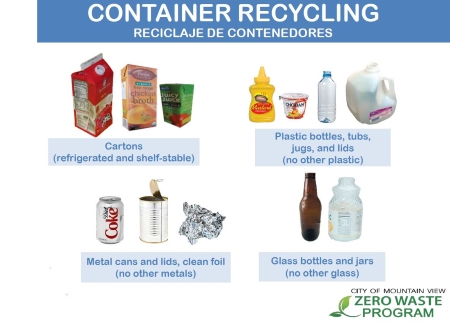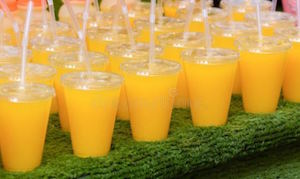
These are not recyclable.
As many of you know by now, we are generating more plastic than we are recycling. Way more. The Economist shared this graph a few years ago, showing that globally we recycle very little plastic.
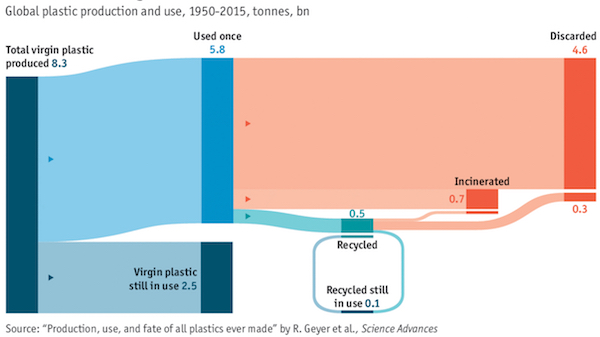
Little plastic is recycled globally. Source: The Economist
Maybe you think that the United States is doing a good job? Well, the EPA reports that in 2017 we recycled just 8% of the plastic we generated.
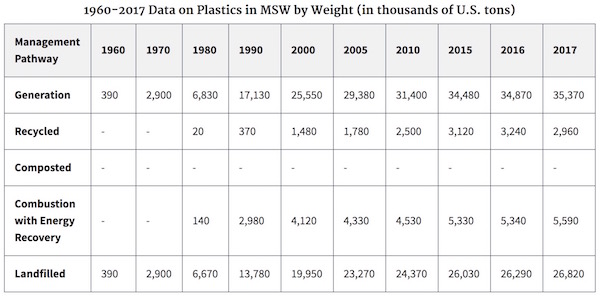
Little plastic is recycled in the United States. Source: Environmental Protection Agency
Greenpeace published a report earlier this year analyzing our recycling capability. They concluded that while there is a market for #1 and #2 bottles and jugs (1), much else should not even be labeled “recyclable” because of the lack of sufficient verifiable demand. As a result, few facilities accept these common plastic items.

Many everyday plastic items are not recyclable. Source: Last Beach Cleanup
Julia Au of RethinkWaste, which handles recycling for much of San Mateo County from Menlo Park to Burlingame, agrees that demand for these materials is insufficient. “The contractor who markets our materials ... has told us that right now, PET #1 and HDPE #2 have good markets. For #3-7 plastics there are no markets and for us, these materials are actually landfilled.” Lori Topley, Mountain View’s solid waste program manager, says that “In Mountain View, if the plastic item is on our ‘accepted’ list, it is getting successfully delivered to market,” while pointing out that their accepted list is pretty limited. Just like Menlo Park and others, Mountain View sends plastic clamshells, cups, plates, utensils, and more to landfill because there is no market. A California-based expert I contacted pointed to the Long Beach program as an exemplar of modern-day recycling. It focuses on item types rather than numbers: “Plastic bottles, jugs, and tubs” go in the recycling bin, and nothing else. In general, he said that #1 and #2 are fine (e.g., bottles and jugs) and, as a stretch, #5 if it is “bigger than your fist” (e.g., tubs). Palo Alto’s program is more liberal than these, but I did not hear back from them in time for this post. (2)
The lack of demand for many kinds of used plastic is why agencies like Recology are working to eliminate unrecyclable plastics at the state level. But despite their efforts and a groundswell of public support, California’s legislature failed a few weeks ago to pass a bill that required manufacturers to significantly reduce the amount of plastic waste from their products going to landfill. (3) The bill was fought by the packaging industry, the oil industry, and also by an agency representing big retailers like Target. (4) Their preferred solution continues to be to fix recycling.
All of this means that we have many more years to deal with piles of plastic in the products that we buy. The next step to pushing back on manufacturers is a ballot proposition directly to the people of California, bypassing a legislature that is heavily influenced by lobbyists. The proposition is similar to the bill but also adds a one-cent tax on single-use plastics. It won’t be on the ballot until 2022 because coronavirus impeded signature gathering. (5) What can we do to reduce plastic use in the meantime?
With all of this in my mind at the outdoor event, gazing at the table full of drinks, I turned to the volunteer who had done the ordering and said something like “Hmm, I wonder if we could get paper cups instead?” She responded “Well, these are recyclable”, and I didn’t have the heart to go on. She had mentioned earlier that she often uses a certain restaurant for these events as they offer a good price and she likes working with them.
So, I spoke up but not very successfully, and probably annoyed the person who had gotten the food together. Should I have said anything? If so, what might have been more effective? If you were doing the ordering, would you have said something to the vendor? Would you have requested paper cups for the drinks, even though they wouldn’t look as nice?
Here’s a related incident that came up in the past few days. A neighbor posted this on Nextdoor, trying to find a home for plastic items collected over time:
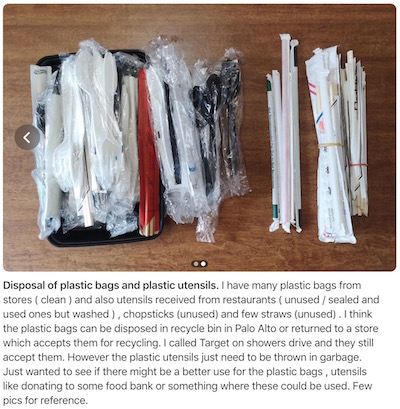
I love that he/she is trying to find a good home for the plastics, but it also reinforces the need to push back on getting them in the first place. For example, when ordering takeout, we can make a request: “No utensils please”. Have any readers been doing this successfully? The more we speak up, the more vendors will understand that we care, and consider changing their behavior to reduce waste.
I’d love to hear what’s worked for you (or not) in trying to reduce our use of single-use plastics. My next blog post will go into more depth on the difficulties of recycling plastic and the pitfalls of “aspirational recycling”.
Notes and References
1. The Greenpeace report makes a point that bottles and jugs with “full-body shrink sleeves” (see picture below) are not recyclable unless the sleeve is removed.

2. Update: I did hear back from Palo Alto, who says "We do have markets for the plastics we accept, however, many are marginal materials. That is why we are working on expanding old and creating new policies, programs, and outreach campaigns to encourage people to use reusables." Palo Alto takes many plastic items, including plastic cups. But at what cost? Palo Altans should understand that these markets are not stable and likely costly, and recycling virtually anywhere else is the “Bottles, jugs, and tubs” approach.
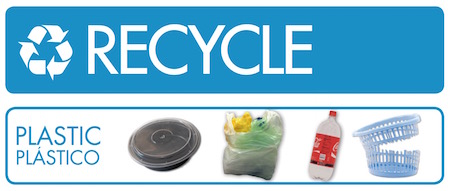
Palo Alto accepts more plastics, but at what cost?
3. Specifically, the bill would have required manufacturers to ensure, by 2032, that all single-use plastic packaging and specific common items (e.g., utensils and containers) are truly recyclable or compostable, and that 75% of landfill-bound waste from those items is eliminated.
4. This CalChamber writeup enumerates their argument, which includes that the bill doesn’t cover enough of the costs to recycle their plastic, that it is inadequately specified, that it gives too much power to CalRecycle, and more generally that the regulation adds bureaucracy and cost.
5. CalMatters and Politico have some more information on why the bill failed and the upcoming proposition.
Current Climate Data (July/August 2020)
Global impacts, US impacts, CO2 metric, Climate dashboard (updated annually)

Arctic sea ice is far below normal, at its second-lowest minimum in the 42-year record. “In the first week of September, sea ice extent took a sharp downward turn, exceeding the pace of decline for any previous year during that period, and placing the 2020 sea ice minimum firmly as second lowest—after 2012—in the 42-year continuous satellite record.” Source: National Snow and Ice Data Center
Comment Guidelines
I hope that your contributions will be an important part of this blog. To keep the discussion productive, please adhere to these guidelines or your comment may be moderated:
- Avoid disrespectful, disparaging, snide, angry, or ad hominem comments.
- Stay fact-based and refer to reputable sources.
- Stay on topic.
- In general, maintain this as a welcoming space for all readers.




